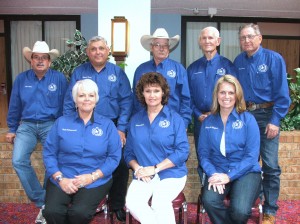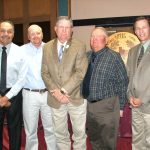Highlights From Odessa
Contrary to what some may think, when it comes to day-to-day county business, the county judge is not in charge.
Rather, the judge is the chief administrative officer, said Wichita County Judge Woodrow W. Gossom Jr., who took office in 1999 after serving as county commissioner 1989-1998. Equally important, the judge is the “consensus builder.”
“We carry two buckets of water,” Gossom told officials gathered at the 83rd Annual West Texas County Judges and Commissioners Association Conference. “We use one bucket to put out fires, and one to help with thirst.”
Speaking of fires, the county judge is in charge when it comes to disasters. Otherwise, judges are one member of a five-member team, with the judge’s vote equal to the votes of the four individual commissioners.
“That team of five is very important,” Gossom emphasized. “Be careful what you do to each other.”
 Some 300 of these team members gathered in Odessa April 24-27 for the West Texas Annual Conference, where county judges and commissioners were schooled on the latest topics affecting grassroots government.
Some 300 of these team members gathered in Odessa April 24-27 for the West Texas Annual Conference, where county judges and commissioners were schooled on the latest topics affecting grassroots government.
For example, with the continual explosion of social media, officials must now examine the concept of open meetings in a new light, as explained by Charles R. Kimbrough, attorney with Bickerstaff Heath Delgado Acosta LLP, of Austin.
In his presentation titled, “The Internet, Smartphones, Social Media and the Texas Open Meetings Act: Traps for the Unwary,” Kimbrough explored the challenge of conducting business in a modern information society and presented a key question and thought-provoking conclusion.
v Question: When measured against the serious litigation risk issues associated with proper compliance under the Texas Open Meetings Act (TOMA), the cautious, law-abiding public official in Texas reasonably might ask the following question: How do I not violate TOMA when using, or if contracted through, the Internet, a smartphone, or social media?
v Conclusion: Being a public servant today is hard work. You should acknowledge the challenging environment and try hard each day to succeed at three seemingly simple but often difficult tasks in the performance of your official duties:
- Be right on the law.
- Be right on the ethics.
- Avoid even the appearance of an impropriety.
Kimbrough paid special attention to the “walking quorum” and “prohibited closed meeting” violations, both criminal offenses which carry maximum penalties of six months in jail plus a $500 fine.
Under TOMA, a public official commits a prohibited closed meeting violation if a closed meeting is not permitted and he or she knowingly calls or aids in calling, closes or aids in closing, or participates in a prohibited closed meeting.
Under TOMA, a public official commits a walking quorum violation if he or she knowingly conspires to circumvent TOMA requirements by meeting in numbers less than a quorum for the purpose of secret deliberation, also referred to as “sequential conferencing” by members of the body in numbers less than a quorum.
Both of these violations require specific intent by a public official to knowingly conspire to circumvent the requirements of TOMA, Kimbrough reiterated.
The Office of the Texas Attorney General has concluded that the “physical presence of a quorum in a single place at the same time is not always necessary for a violation…to occur.” (Op. Text. Att’y Gen. No. DM-095). However, each case depends on the facts.
A walking quorum or prohibited closed meeting could indeed result in a TOMA violation if intent is proven. However, the existence of innocent, limited communication without specific intent may not be enough to establish the violation, Kimbrough explained.
“The line is murky,” he noted. “So find that line, get off that line, and avoid even the appearance of impropriety.”
Kimbrough encouraged officials to continue to pursue and complete training to learn the facts and keep apprised of the law, which “will provide the best opportunity for you to avoid the serious problems associated with an alleged open government violation.”
“If you continue coming (to conferences) and studying, you can be right on the law, and right on the ethics,” he declared.
Following Kimbrough’s presentation, a legislative panel took to the stage to close out the four-day conference.
Rep. Drew Darby, R-San Angelo; Rep. Tryon Lewis, R-Odessa; and Rep. Charles Perry, R-Lubbock, alluded to critical issues facing both the State of Texas and its county partners, including an impending water crisis, a stagnant road system, and Medicaid costs.
“We’ve got to be bold enough to talk about transportation and water funding,” Perry stressed, not to mention “the 800-pound gorilla in the room – which is Medicaid.”
The first-term legislator called on the Texas Legislature to step out and address the tough issues, even if it means showing some “tough love” in areas such as Medicaid entitlement.
“It’s time we get honest,” Perry underscored. “It’s time we plan ahead. And it’s time we work on 20-year cycles rather than two-year election cycles.”
As lawmakers look ahead, input from county-level officials is crucial.
“We’re going to need to hear from you, and we’re going to need to hear from you on a constant basis,” Darby insisted.
Communication is critical, echoed Lewis, who likened the House of Representatives to commissioners court.
“You’ve got to convince other people – in this case 149 other people – who have other things on their mind,” he said in comparison. In addition, officials need to explain to their constituents “not only what is being done, but also why things are being done.” Finally, both state and county officials are faced with the problem of turning down worthwhile programs due to revenue shortfalls.
“Not all good programs can be funded,” Lewis maintained, and counties face the same challenge.
Along with taking part in classes and Q&A sessions, officials in the 118-county West Texas Region took care of Association business, passing five resolutions, selecting scholarship winners, and electing their 2012-13 slate of officers (see related reports).
 The 84th Annual West Texas County Judges and Commissioners Association Conference will take place April 22-26 in Midland County. Please monitor the County Progress County Calendar in the back of the magazine for registration details. H – By Julie Anderson
The 84th Annual West Texas County Judges and Commissioners Association Conference will take place April 22-26 in Midland County. Please monitor the County Progress County Calendar in the back of the magazine for registration details. H – By Julie Anderson







